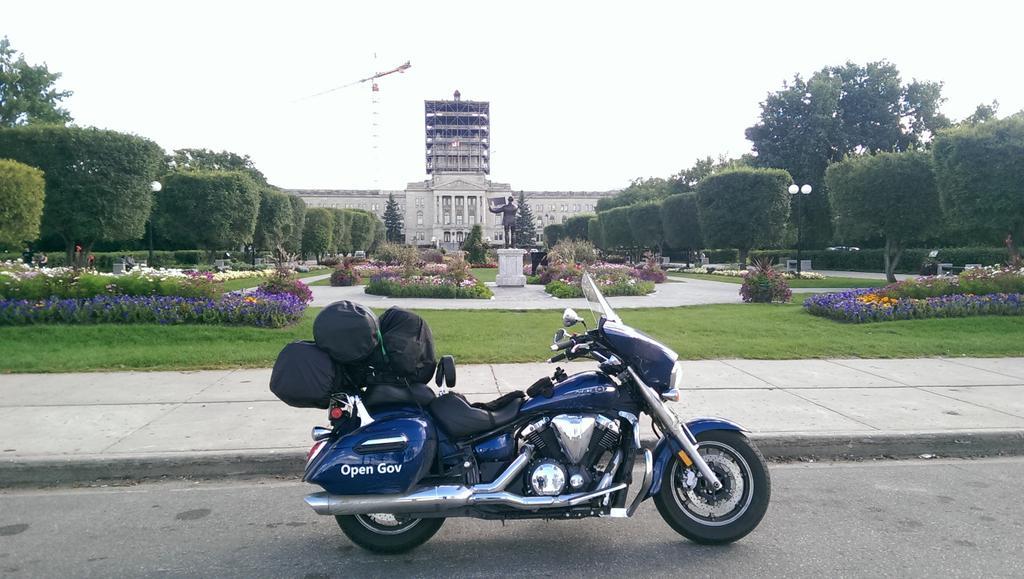
The way this story is emerging interests me more on what it says about the system than it does about any one person in it. Partially, that comes down to the sorts of personalities that politics attracts, but that, too, is a structural/cultural thing.
Let's say Rob Ford was strictly at Deco Labels in some sort of leadership capacity when the first symptoms of his ailment emerged. One would imagine, given his personality profile, Ford would have ignored the pain for a while, simply not wanting to have to deal with it.
Eventually, though, he'd start to grow concerned enough about his health to get checked out. This would likely have happened sooner than it has now.
Why?
As an executive at a company, Ford would have employees, a management team, etc. He'd have the option to delegate more work, take a leave of absence or even play the same role, but in a more low-key fashion from what one hopes is a forthcoming recovery period.
Ford isn't a boss at a company, though - he's chief magistrate of a City fighting an election campaign.

Election campaigns are fights-to-the-finish; any blood in the water and your opponents will pounce, the people will doubt your ability to be the only one who can keep the city going/protect the city from those who would harm it/strengthen the city to be more than it is.
And so the leader who is ill must make a choice between staying involved or taking care of their health.
Yes, we admire those who face personal adversity and soldier on regardless. It's inspiring, really, to watch people neglect their health on our behalf. But how much sense does that actually make?
We live in a democracy. We have a weak-mayor system. In theory, the mayor is just one more vote, but can serve as agenda-setter and cheerleader-in-chief on some issues. They serve as top PR person for the City, both in terms of attracting attention but also bolstering community morale, especially in times of hardship and crisis.
In a pinch, though, there's no reason the Deputy Mayor or even another Councillor can't carry some of that weight. In fact, it makes more sense for them all to do this in rotation, so that each Ward has a chance to be highlighted on the broader stage.
Smart leadership sets obsolescence as its primary directive - to make sure that the ship keeps sailing after they've left the wheel.
In an ideal world, Rob Ford should be in a position where, his health at risk, he is comfortably able to pass the baton on and focus one what's most important, ie getting well.
Of course, this isn't how he's positioned himself. He has been, since day one, about Rob Ford as the answer to the city's problems. His self-articulated plan was to get in and never look back, almost as though he were setting himself up as a feudal lord rather than an elected official in a dynamic political system. This thread runs through all the work he's done - he was all that kept his football players from a life of crime, etc.
These attributes speak to his personality, which is fine - there are lots of functionally fixed alphas out there.
I think it's fair to say that there are an inordinate amount of them in politics, though.
We've seen a gradual shift at the provincial and federal levels towards power and decision-making being centralized in the offices of the leader; as such, political parties can swing massively in their direction as one leader and core team gives way to the next, even when the same Party remains in power.
There are two big problems with this top-down leadership structure.

When direction changes the moment a leader changes, the work begun by a predecessor can grind to a halt. Millions, billions of dollars in planning, development and implementation can be side-tracked or shifted, leaving bureaucrats skittish about investing themselves in their labour and the public/private sector uncertain about what to expect.
The second issue is that a focus on top-down leadership leaves out the rest of the elected representative sin the conversation; essentially, that means the chosen voices of the majority of an electorate are marginalized. Not only does this limit the capacity of citizens to be represented, but it leaves the public whether they can be represented.
How many voters make their ballot-box choice based on their perception of the leader? Yet in our system, citizens don't vote for the leader; they vote for a Member. When the Member is ignored or becomes a parrot for the leader, you end up with an electorate that is making decisions based on an inaccurate understanding of the system, meaning they're actually marginalizing their own representation.
For the leader's side of things, then, the focus is less on a strong team and succession than it is on individual strength and, as a corollary, not appearing weak. Politics is a blood sport, etc. You have to come across as almost a demi-god with magical powers to right social wrongs or an omniscient sense of what really matters to the structural well being of every facet of the system to know what priorities really matter.
Which brings us back to Rob Ford.
It's always been my view that Rob Ford is a great case study of the failings within our current political model; he's a caricature of what's not working and why it's not working.
Ford has, at best, a mediocre understanding of policy. He's got an incredibly limited understanding of the City's people in all their diversity. Ford has a sense of entitlement that comes with the perception of absolutism. He also figures that he is right on his positions by virtue of being Rob Ford. It's like the Diving Right of Mayors.

For his approach, Ford has been a disaster as a Mayor. He's embarrassed the city, jammed up important projects, created necessary divisions, so on and so forth. At the same time, being mayor hasn't been kind to him. Ford's faced countless health and personal challenges throughout his term and has, by all accounts, battled with inner demons about his ability to measure up.
These aren't things he can deal with publicly, nor even admit to himself, because to do so is to imply weakness that is unbecoming in a leader.
So we come to this - a man with noble intent, but the wrong approach, in a position where he felt it necessary to put his health at risk so as to maintain his hold on power, a hold that has been detrimental to the City he loves.
This isn't a dynamic system. Our current political system is about power plays and sizzle, not leadership and steak.
I hope that Rob Ford is able to step back from his public position and focus on what matters most - his health. In this, I hope he has the full support and love of his family and political allies, but also the rest of us. We're all human.
For the rest of us, I'd say it's time we recognize the sickness within our system and ask ourselves how long we're willing to continue ignoring it - and what the consequences will be if we wait too long to address it.


